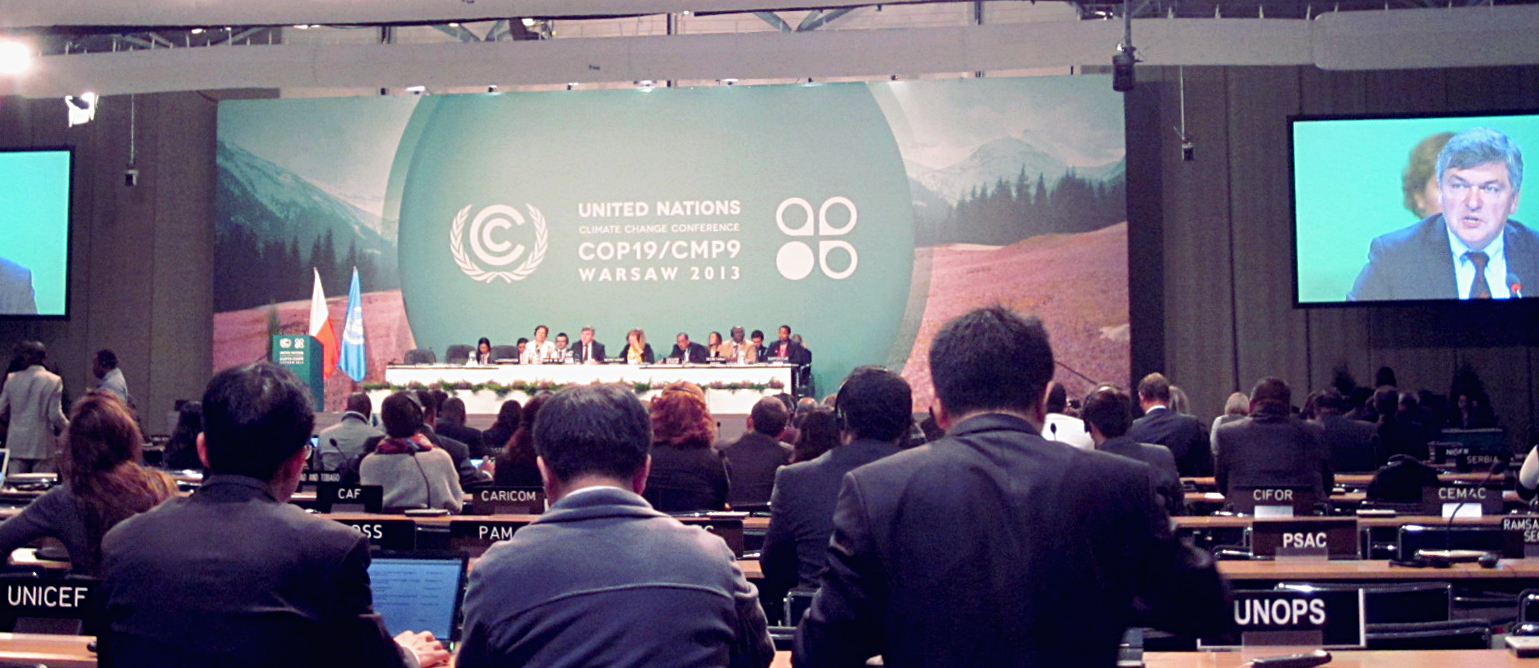By Weiting Chao
Translation : Lawrence Myers
Passage au crible n°102
 Source: Chaos International
Source: Chaos International
From November 11-23 2013, the 19th session of the Conference of the Parties (COP 19) in the United Nations Framework Convention on Climate Change (UNFCCC) was held in Warsaw and the 9th session of the Conference of the Parties acting as the union of the Parties of the Kyoto Protocol (CMP 9). For the first time in history, and on the eve of its official closure, the environmental NGOs boycotted the climate conference.
> Historical background
> Theoretical framework
> Analysis
> References
One hundred fifty-three countries created the UNFCCC after the Earth Summit held in Rio in 1992. The organization put into place the principle of common and differentiated responsibility in respect of equity. The period preceding the Summit was marked by intense activity by NGOs. Many of them sought to directly influence governmental decisions. In 1997, the States signed the Kyoto Protocol founded on work completed by the UNFCCC. This document is the sole global treaty to date that enforces binding obligations on industrialized countries. Yet, in 2001, alluding to a breach of the development of the American economy, the United States refused to ratify it. After Russia’s signature of the Protocol, the treaty came into force in 2005 and expired December 31, 2012. The post-Kyoto period was mentioned beginning in 2005 and during the Bali Conference (COP 13, 2007), the signatory States adopted a roadmap that they should have been finalized in Copenhagen in 2009. However, no significant progress was recorded. During the Durban Conference in 2010, a subsidiary body was established: the ad hoc working group, integral part of the Durban Platform for a reinforced action ; this aim of this authority is to design another document. During the same period, a financial mechanism the Green Climate Fund was launched. It should bring about the transfer of resources from the most advanced countries towards the most vulnerable ones. The adoption of a universal treaty on this question was postponed until 2015, with an implementation planned for 2020. However, in 2012, the Doha negotiations only led to a simple prolongation of the Kyoto Protocol until 2020.
In 2013, little before the conference was held, the industrialized countries reaffirmed that they would not participate in a second wave of reduction of CO2 emissions under a new Kyoto protocol. Following this logic, Australia must for example abandon its carbon taxation system. As for Japan, it announced that due to the Fukushima accident, its CO2 emissions would go up 3.8% between now and 2020, despite the fact that it had previously committed itself to reduce them by 25%. During the negotiations, the United States, Australia and Canada attempted to modify the principle of common responsibility, changing the obligations of the States in respect to equity and the framework of the treaty. Furthermore, they strongly opposed the implementation bearing on losses and damages. This position, however, drove the countries of the Group of the 77 (G77), including China, to leave the negotiations. Finally, the latter having proved to be sterile and unproductive, NGOs such as Oxfam International, Greenpeace or the World Wide Fund for Nature (WWF), decided to leave the climate conference on Thursday, November 21, in other words, on the eve of the official closure.
1. States dominated by merchant logic. The confrontation between developed countries and developing countries worsened due to the modification of the principal of common responsibility and the global lack of financial resources. At present, states appear to be dominated by a structural logic – that of the market – which imposes itself on them, divides them and by way of consequence ruins all possibility of concluding an ambitious treaty on climate change.
2. Collective lobbying of NGOs. The boycott springs from a form of non-state diplomacy. It makes up an integral part of the repertory of NGOs’ collective action. In this case, it’s about pressuring states’ decisional process, without ceding whatsoever on the final objectives. It’s about a strategy that resembles a zero-sum game (Schelling).
The conflict between developed and developing countries remains fundamental and clearly shows the difficulties of inter-state cooperation. It should be noted that the mistrust between states is due to the inefficient financing of the Green Climate Fund. In Copenhagen, while developing countries were promised 100 billion dollars (73.8 million euros) per year between now and 2020, progress remains to be seen as to the aid promised by industrialized countries to countries in the Global South so that they can face climate disasters. Between 2010 and 2012, around 30 billion dollars were given, but since then, developing countries do not have any assurance for the years to come. In other words, for lack of capital, there is no real cooperation between state actors, eroding all negotiations. Besides, states hardly control the production process and from now on they direct little trade. Indeed, the governments of industrialized countries allowed themselves to be led almost exclusively by the interests of large fossil fuel energy companies or insurance companies. Thus, market mechanisms such as Emissions Trading and the Clean Development Mechanism, are inspired from the imminent major regulations intended to reduce carbon emissions. Ironically, it is therefore the high investments and commercial interests that have allowed continuity of the negotiations.
To be able to develop in a particular area, environmental NGOs have acquired expertise and hold a key role in the works on climate change. They have issued suggestions and technical advice to the CCNUCC, and some of their proposals have strongly influenced the Kyoto Protocol. Indeed, they mobilized their capacity to produce scholarly studies that are authoritative in the area. In the same way, they benefitted from field experience, old and in-depth, in order to guide the texts. Finally, they have succeeded in participating in global coalitions comprising both governments as well as companies and organizations of the sector concerned ; seeking in that way to influence the global process. Consequently, the volume of assistance for technological development brought by NGOs to LDCs (least developed countries) or to small, developing, insularly states has progressively grown since 1997. In certain cases, their power to mobilize protests, which confers an important role on them, is considered to be a detector of discontent or dissatisfaction.
This boycott represents a diplomatic pressure that compensates their status of non-state operators. In so doing, it accentuates the pressure on the United Nations, which fears losing its credibility, but also on Poland, the host country. Otherwise, NGOs are worried about the deficit of governance on climate issues. Their refusal to help with the conference makes for a strong symbol : by removing themselves from negotiations, which did not put the public’s interest ahead of that of companies, they led a symbolic, global conflict. Whereas the environmental pressure increases, government delegates will – during their next meeting – give more scope to their proposals, if they want a substantial agreement for 2020.
Corell Elisabeth, Michele M. Betsill, « A comparative look at NGO Influence in International Environmental Negotiations: Desertification and Climate Change », Global environmental Policy, MIT press, Nov. 2001 (4), pp. 86-107.
Chao Weiting, « Le triomphe dommageable des passagers clandestins. La conférence de Doha », in : Josepha Laroche (Éd.), Passage au crible, l’actualité internationale 2012, Paris, L’Harmattan, 2013, pp.111-115.
Esteves Olivier, Une Histoire populaire du boycott (1880-2005), Paris, L’Harmattan, 2006.
Schelling Thomas, The Strategy of Conflict, Harvard University Press, Cambridge, 1960. York, 1963.
Strange Susan, Le retrait de l’État. La dispersion du pouvoir dans l’économie mondiale, trad., Paris, Temps present, 1996.




